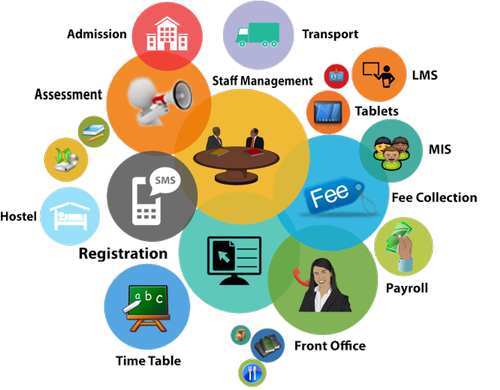Transforming Education Management with ERP: A Comprehensive Guide
In today's rapidly evolving educational landscape, managing academic institutions efficiently and effectively has become more challenging than ever before. From student admissions and enrollment to faculty management, resource allocation, and financial planning, educational institutions face a myriad of complex tasks that demand streamlined processes and integrated systems. This is where Enterprise Resource Planning (ERP) software steps in to revolutionize the management of educational institutions.
Understanding ERP for Educational Institutions
ERP systems are comprehensive
software solutions designed to integrate and streamline various business
processes within an organization. While traditionally associated with corporate
enterprises, ERP solutions have gained significant traction in the education
sector due to their ability to centralize data, automate processes, and enhance
overall efficiency.
For educational institutions, ERP
software offers a centralized platform to manage diverse functions such as
student information, academic programs, human resources, finances, and
facilities. By consolidating these operations into a single, cohesive system,
ERP empowers educational administrators to make informed decisions, optimize
resource utilization, and provide a seamless experience for students, faculty,
and staff.
Key Features and Benefits
Student Information Management:
ERP systems enable educational institutions to efficiently manage student data,
including admissions, enrollment, attendance, grades, and academic progress.
With integrated portals, students can access their information, track their
academic journey, and communicate with faculty and administrators seamlessly.
Academic Program Management: From
course scheduling and curriculum planning to faculty assignments and classroom
allocation, ERP software streamlines the management of academic programs.
Institutions can optimize course offerings, allocate resources effectively, and
ensure compliance with accreditation standards.
Faculty and Staff Management: ERP
solutions facilitate the administration of faculty and staff processes,
including recruitment, onboarding, payroll, and performance evaluation. By
automating routine tasks and providing comprehensive employee profiles,
institutions can enhance workforce management and foster a culture of
accountability and productivity.
Financial Management: With robust
financial modules, ERP systems enable educational institutions to manage
budgets, track expenditures, generate financial reports, and streamline
procurement processes. By gaining real-time visibility into financial data,
institutions can make informed decisions, mitigate financial risks, and ensure
fiscal responsibility.
Resource Planning and Allocation:
ERP software helps optimize the utilization of resources, including classrooms,
laboratories, equipment, and facilities. By leveraging data analytics and
forecasting tools, institutions can allocate resources efficiently, reduce
wastage, and enhance operational efficiency.
Integration and Scalability: One
of the key advantages of ERP systems is their ability to integrate with
existing systems and scale according to the evolving needs of educational
institutions. Whether it's integrating with learning management systems (LMS),
student information systems (SIS), or third-party applications, ERP ensures
seamless data exchange and interoperability.
Data Security and Compliance:
Given the sensitive nature of student and institutional data, ERP solutions
prioritize data security and compliance with regulatory requirements such as
GDPR and FERPA. By implementing robust security measures, including role-based
access controls and data encryption, institutions can safeguard sensitive
information and maintain regulatory compliance.
 |
| ERP For Educational Institutions |
Implementation Considerations
While the benefits of ERP for
educational institutions are compelling, successful implementation requires
careful planning, stakeholder engagement, and strategic execution. Here are
some key considerations for implementing ERP systems in educational settings:
Needs Assessment: Conduct a comprehensive
needs assessment to identify the specific requirements and challenges of your
institution. This involves engaging stakeholders across departments to
understand their workflows, pain points, and desired outcomes.
Vendor Selection: Evaluate ERP
vendors based on their industry expertise, track record, scalability, and the
comprehensiveness of their solutions. Look for vendors with experience in the
education sector and a proven track record of successful implementations.
Customization and Configuration:
Work closely with the selected vendor to customize and configure the ERP system
according to the unique needs of your institution. This may involve configuring
workflows, data fields, and user interfaces to align with existing processes
and preferences.
Training and Change Management:
Invest in comprehensive training programs to ensure that faculty, staff, and
administrators are proficient in using the ERP system. Additionally, develop
change management strategies to mitigate resistance to change and foster a
culture of adoption and continuous improvement.
Data Migration and Integration:
Plan for seamless data migration from existing systems to the new ERP platform,
ensuring data integrity and consistency throughout the transition process.
Additionally, establish robust integration mechanisms to facilitate data
exchange with other systems and applications.
Monitoring and Evaluation:
Continuously monitor the performance and usability of the ERP system
post-implementation, soliciting feedback from users and stakeholders. Identify
areas for improvement and optimization, leveraging analytics and reporting
tools to drive data-driven decision-making.
Conclusion
In an era of digital
transformation, ERP systems have emerged as indispensable tools for educational
institutions seeking to enhance efficiency, transparency, and accountability
across their operations. By centralizing data, automating processes, and
integrating diverse functions, ERP software empowers institutions to adapt to
evolving challenges and deliver exceptional educational experiences to
students, faculty, and staff.

Comments
Post a Comment